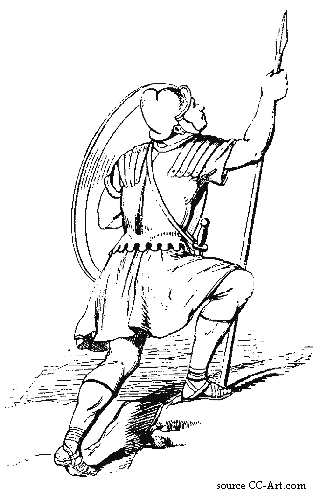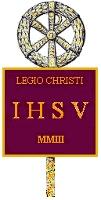I believe in God, the Father omnipotent.
And in Jesus Christ, his only Son, our Lord;
who was born of the Holy Spirit and Virgin Mary;
under Pontius Pilate, was crucified, and buried;
the third day he rose from the dead; ascended into heaven,
and sits on the right hand of the Father;
he shall come to judge the living and the dead.
And in the Holy Spirit;
the Holy Church;
the forgiveness of sins;
and the resurrection of the body.
or comparable statement or doctrine
Credo, ergo confiteor
cordis signaculum et nostræ militiæ sacramentum
Say your Creed daily Morning and Evening
A Christian Soldier's Watchword "Symbolum", by which the true soldier of Christ was distinguished from those who did not believe.
For the purpose of the Order of Centurions - any commonly accepted affirmation of faith used in the Church or any comparable doctrine or individual affirmation of the basic tenets of the original baptismal creed, is sufficient, so even one who said he had no creed but the Bible would able to affirm the basic tenets of the creed based on Holy Scripture.
This form was used in early Rome. It is found in the baptismal liturgy of the Apostles Doctrine written in about 215 by Hippolytus to preserve ancient customs. It was likely what a Centurion seeking inclusion in the Christian community would have memorized, believed, and publicly confessed before baptism. All elements of this form can be proved by Holy Scripture. It was "not given at length in the early manuscripts, since it was not to be written on paper, but to be engraved on the memory, and to serve the baptized Christian as a viaticum [knapsack of supplies] for his journey through life, and by which he might test the doctrine of any other teacher." It was used as a Watchword between Christians so that they might know that another was true, in the same way as a commander gives a soldier a challenge and password to identify friend from foe. One had to know it word for word by heart as it was not to be recorded. These beliefs, and a knowledge and faith in the Scriptures, continue to aid Centurions in their journey today. See Rufinus' Commentary on the Apostles Creed. This Creed is said Daily twice, Morning and Evening. So it was of old. Aug. l. 1. de Symb. ad Catech. cap. 1. Take the Rule of Faith, which is called the Symbol or Creed, say it daily, in the Morning before you go forth; at Night before you sleep. And l. 50. Hom. 42. Say your Creed daily Morning and Evening.In 325 the Church published an expanded creed to fight against heresies. The First Ecumenical Council met at Nicaea, called by Emperor Constantine (video lecture). There, 318 bishops from around the world met. A section was added to the Creed in 381 by 150 bishops at the Second Ecumenical Council of Constantinople and confirmed by following ecumenical councils. This Nicene-Constantinople creed is still used throughout orthodox-catholic Christianity today and is known as the
Nicene Creed The Nicene Creed was later introduced into the Eucharist liturgy in the East as a safeguard against Arianism. This practice eventually spread to the West and is in practice in modern liturgies.
In the year 451, Church fathers gathered at Chalcedon in the Fourth Ecumenical Council and published the the Chalcedonian Creed clarifying the orthodox belief in the nature of Christ.
The so-called Creed of Saint Athanasius was likely written by Hilary, Bishop of Arles in Gaul in about 430. It became widely used in the West to train clergy as an exposition of the Creed based on the teachings of Augustine, and was used as a creedal hymn, but it was not used in the East.
The "te Deum laudamus" is a very early creedal hymn from about the year 500.
Some very early creeds:
* Jesus is Lord
* If thou shalt confess with thy mouth the Lord Jesus, and shalt believe in thine heart that God hath raised him from the dead, thou shalt be saved.
* Ichthus Acrostic - The acrostic "ICHTHUS" is the Greek word for "fish" (Iota, Chi, Theta, Upsilon, and Sigma.) The English alphabet rendering is IXOYE. It was used as a symbol for Christians in the fish form in the 1st and 2nd Centuries especially, and the words were said to have stood for the phrase, "Jesus Christ, God's Son, Savior" (“Iesous Christos, Theou Uios, Soter").See ANCIENT FORMS where the reader will find a quite detailed discussion of these early beliefs, and CREEDS of CHRISTENDOM where modern beliefs from every major denomination are found.
ANCIENT FORMS * CREEDS of CHRISTENDOM
Church Fathers on the Scripture as the First Source of Authority "We know that the Scriptures are perfect as being spoken by the Word of God and His Spirit" [Irenaeus ]
"I adore the fullness of Scripture, which declares to me the Creator and His works"; [Tertullian]
"In the two Testaments...every word that appertains to God may be sought out and discussed, and out of them all knowledge of things may be understood. And if anything remains, which Holy Scripture does not determine, no third scripture ought to be received to authorize any knowledge." [Origen]
"Look for no other teacher; thou hast the oracles of God; none teaches thee like these." [Chrysostom]
"In those things which are plainly laid down in Scripture, all things are found, which embrace faith and morals." [Augustine]
"The generality of men still fluctuate in their opinions about this, which are as erroneous as they are numerous. As for ourselves, if the Gentile philosophy, which deals methodically with all these points, were really adequate for a demonstration, it would certainly be superfluous to add a discussion on the soul to those speculations. But while the latter proceeded, on the subject of the soul, as far in the direction of supposed consequences as the thinker pleased, we are not entitled to such license, I mean that of affirming what we please; we make the Holy Scriptures the rule and the measure of every tenet; we necessarily fix our eyes upon that, and approve that alone which may be made to harmonize with the intention of those writings." [Gregory of Nyssa]
"This seal have thou ever on thy mind; which now by way of summary has been touched on in its heads, and if the Lord grant, shall hereafter be set forth according to our power, with Scripture proofs. For concerning the divine and sacred Mysteries of the Faith, we ought not to deliver even the most casual remark without the Holy Scriptures: nor be drawn aside by mere probabilities and the artifices of argument. Do not then believe me because I tell thee these things, unless thou receive from the Holy Scriptures the proof of what is set forth: for this salvation, which is of our faith, is not by ingenious reasonings, but by proof from the Holy Scriptures." [Cyril of Jerusalem]
"We have learned from none others the plan of our salvation, than from those through whom the gospel has come down to us, which they did at one time proclaim in public, and, at a later period, by the will of God, handed down to us in the Scriptures, to be the ground and pillar of our faith." [Irenaeus]
More by Chrysostom on Scripture and Faith
"... I conjure you all, without resting in the slightest degree on the judgment of others, to consult the Scriptures."
“They said that he who adhered to faith alone was cursed; but he, Paul, shows that he who adhered to faith alone is blessed.”
“For you believe the faith; why then do you add other things, as if faith were not sufficient to justify? You make yourselves captive, and you subject yourself to the law.”
“What is the principle of faith? This is salvation by grace. Here Paul shows Godʼs power in that He has not only saved, He has also justified and led them to boast in a different way - not relying on works but glorying only in their faith.”
"We need none of those legal observances, he says; faith suffices to obtain for us the Spirit, and by Him righteousness, and many and great benefits."
Praise God that divine Scripture is our sole infallible, sufficient rule of faith, and that faith is sufficient to justify us before God.
Ecclesia, sine symbolis nulla
Forma Romana Vetus
Credo in Deum Patrem omnipotentem.
Et in Jesum Christum, Filium ejus unicum, Dominum nostrum;
qui natus est de Spiritu Sancto et Maria virgine;
sub Pontio Pilato crucifixus, et sepultus;
tertia die resurrexit a mortuis; ascendit in cælum,
sedet ad dexteram Patris; inde venturus judicare vivos et mortuos.
Et in Spiritum Sanctum;
Sanctam, Ecclesiam;
remissionem peccatorum;
carnis resurrectionem.
Constantine's "Confession" of Faith This God I confess that I hold in unceasing honor and remembrance; this God I delight to contemplate with pure and guileless thoughts in the height of his glory.
His pleasure is in works of moderation and gentleness. He loves the meek and hates the turbulent spirit, delighting in faith. He chastises unbelief.
He is the supreme judge of all things, the prince of immortality, the giver of everlasting life.
God always opens for the human race a pathway to salvation. . . . At the beginning of my life there was wickedness in me, and I did not believe that anyone, not even a god, could even see it, and the consequences of that could have been nothing but ruin. But the Almighty God, enthroned in heaven, had mercy upon me and gave me, his unworthy servant, countless and endless blessings, which I cannot number here."
"One Substance" - in the Nicene Creed, the Greek word "homoousious" is used to indicate that the Father and the Son are of one substance... It was Constantine, who sat as the head of the Nicene Council, who suggested the word to the bishops to help complete a statement of faith that effectually denied the Arian controversy, which held that Jesus, "LOGOS" the Word of God, was a creature of the Father, and thereby not divine. This Arian controversy would eventually affect even Constantine (through his bishop) and plague the church for years to come. The mosaic of the Militant Christ directly relates to stamping out the Arian heresy.
A composite from various sources



